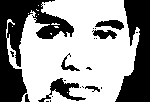Election illusion
Danilo Ara�a Arao
Philippine Daily Inquirer (Youngblood), 21 February 1995, p. 7
IS there hope for social change after the May elections? On the surface, the answer can be found by looking at two things: the list of wannabes who filed their certificates of candidacy, and their party affiliations.
Let's look at the choices. We have a socialite who claims to be a Ramos supporter but who is running under the opposition banner, a bearded Palawe�o who once ran against Fidel V. Ramos but now claims that he has something in common with the administration's vision of development, the son of a former dictator, a basketball hotshot, a renegade colonel who was responsible for the death of innocent civilians, a Marcos lackey who only got exonerated of his crimes when he decided to turn against his boss in 1986, etc.
Can't we pick anyone with a sincere desire to help the impoverished majority? Or for that matter, do we have someone who actually comes from the ranks of the poor?
To be blunt about it, we can't and we don't have. Of course, we have this high-profile secretary who did guest roles in movies and TV sitcoms purportedly to promote government programs. But his much-publicized media campaign against smoking and patak-patak projects, among others, have only provided palliatives to long-standing problems. There are also anti-GATT senators running for reelection, but they voted against the accord mainly because they were with the opposition, and not as a result of an exhaustive study.
But of course to rely on just the background of these candidates would be utterly unfair. they may really be sincere after all, or they may have already decided to rectify their past errors. What better way to know their worth than to look at their ideological convictions, based on their party affiliations?
Okay then, let's DOH, er, do it. As we all know, Christian Democracy is being espoused by the Lakas-NUCD. Now that it has coalesced with the LDP, an erstwhile opposition party, does this ideology still hold? More basic than this, has this ideology been applied in the past or the present?
If memory serves me right, candidate Fidel Ramos said in 1992 that the Christian Democratic program in the Philippines consisted of an alternative debt management strategy characterized by selective debt repudiation, among other things. He also made some progressive posturings and promises, particularly at an Ateneo symposium I attended, so it is not a surprise that a segment of the social democrats decided to support him.
As regards the "ideology" of the NPC, an opposition party, it's in the head (or pocket?) of a rich industrialist who lost in the 1992 presidential polls. Its program of government, if we can call it that, is nothing but a rehash of past opposition plans of action: ridding the government of graft and corruption, "fiscalizing" the administration, etc. Its leaders exhort the people to vote for them on the flimsy excuse that not doing so would ensure the emergence of a Ramos dictatorship. But what is the assurance that the so-called oppositionists will not be coopted (read: bought) if they win?
Anyway, there is also another opposition party, the PRP, that is rumored to be supported by the Church because of the Christian values it espouses, particularly on family planning. It maintains an anti-trapo attitude, and proof of this, according to its stalwarts, is its senatorial lineup composed mostly of political neophytes. Of course, being anti-trapo goes beyond personalities, since we need to look into the methods employed to ensure electoral victory. In the past, the PRP's election strategy has not differed radically from traditional politics: They had promises, pa-cute performances (dancing and singing), catchy slogans, name-calling and mudslinging against (fungus-face) competitors.
Any political science student knows that for a party to depart from traditional politics, it should focus on explaining the issues and clearly stating their solutions to the problems besetting society. Theoretically, a party should aim to politicize, and not to engage in politicking. Political parties since time immemorial have paid only lip service to their commitment to fully explain their stand on issues. So political rallies have been reduced to fiestas, highlighted by surprise appearances of movie celebrities.
Can we expect the May elections to be different from past political exercises? Definitely not, given the lack of clear ideological underpinnings that are essential to making intelligent choices. At best, it will only be different in the sense that there will be less Erap jokes and more Brenda-Mikee-Luna ones.
Another interesting highlight of this election is the "marriage of convenience" evident in both the administration and opposition parties. The Lakas-Laban coalition has erstwhile enemies running side by side (e.g., Enrile-Drilon, Flavier-Tatad). To say that they have buried the hatchet for the sake of party unity and national development is hard to believe, especially since all candidates were selected primarily because of their "winnability" and not their political philosophy.
On the other hand, the NPC has street parliamentarians-turned-politicians sharing the same stage with the son of the President they despised in the past.
This early the campaign is already proving to be entertaining and at the same time depressing. To answer the earlier question, there is absolutely no hope that social change will come via the May national and local elections.
So what do we do now? I think it's time that we seek social change beyond the elections by reading the handwriting on the wall. And what is it? Get out of your comfortable homes, schools and offices and find out.
Danny Arao, 26, is a writer, teacher and a master's student.

